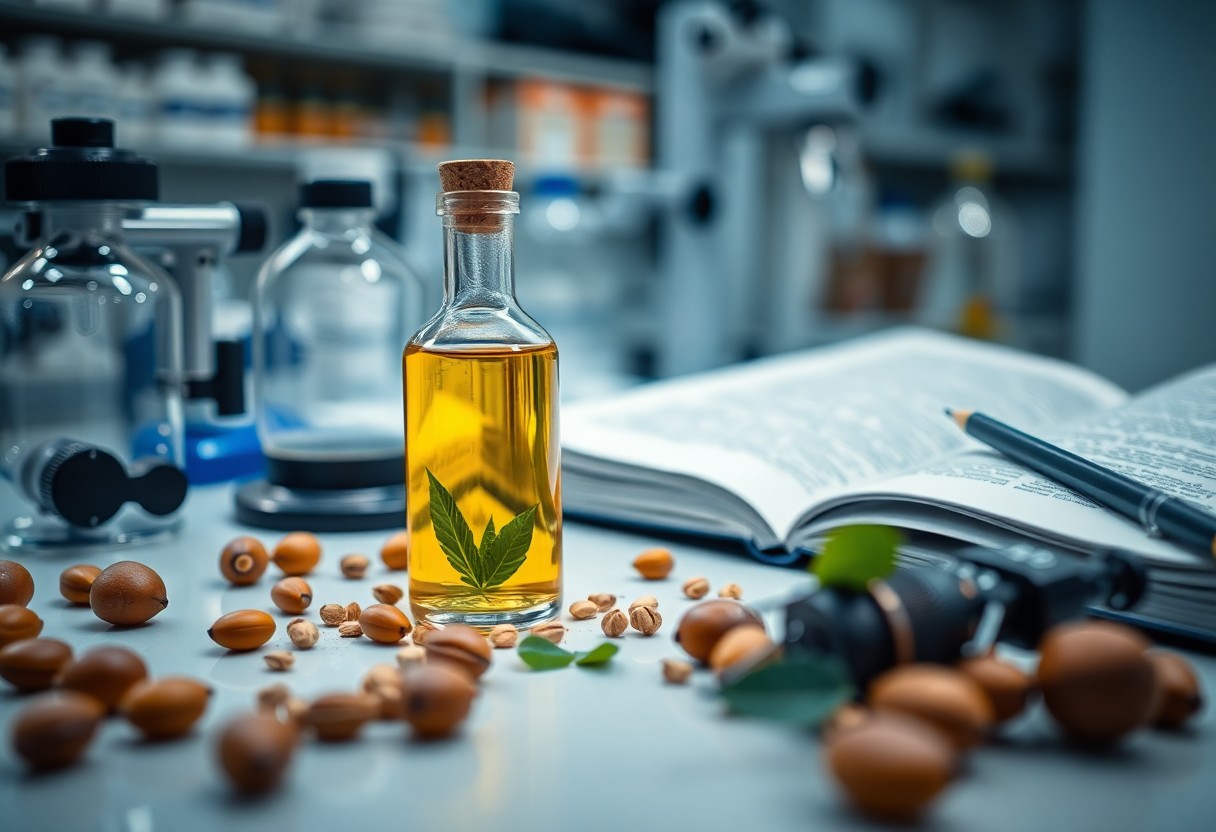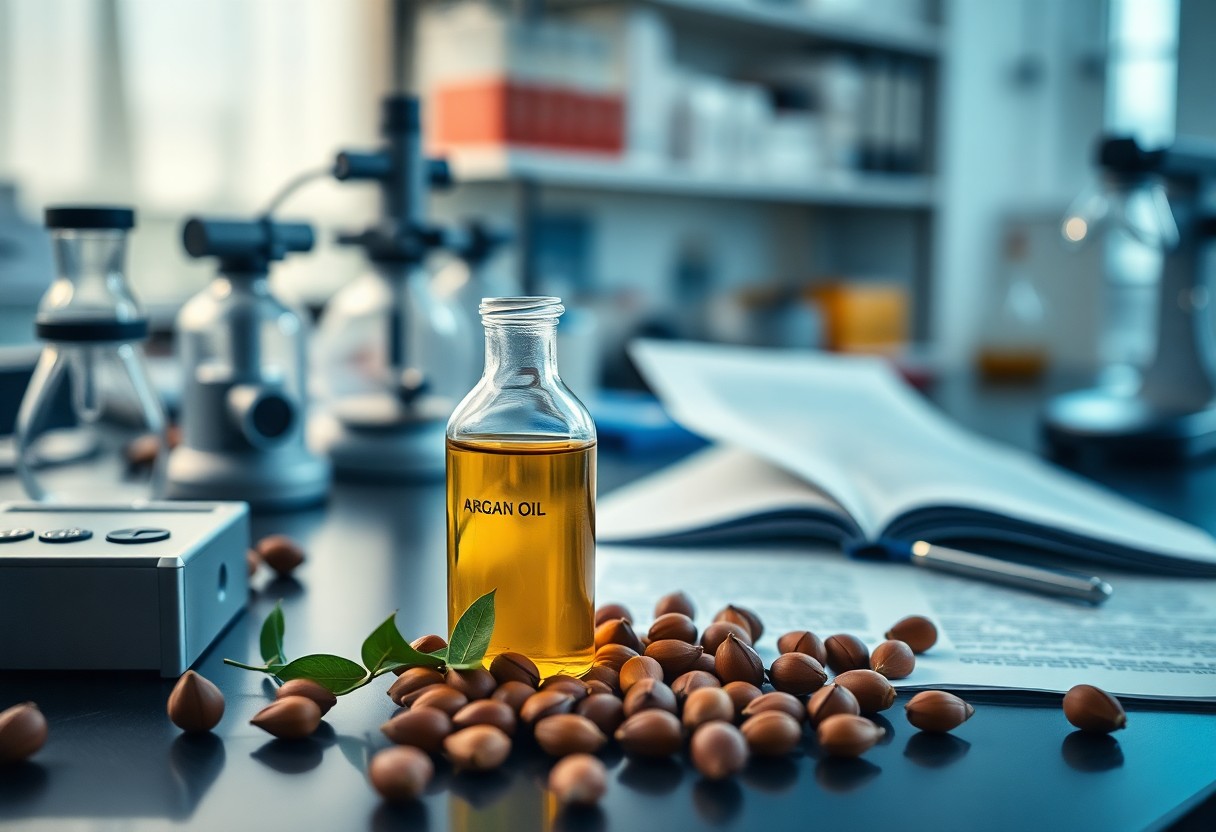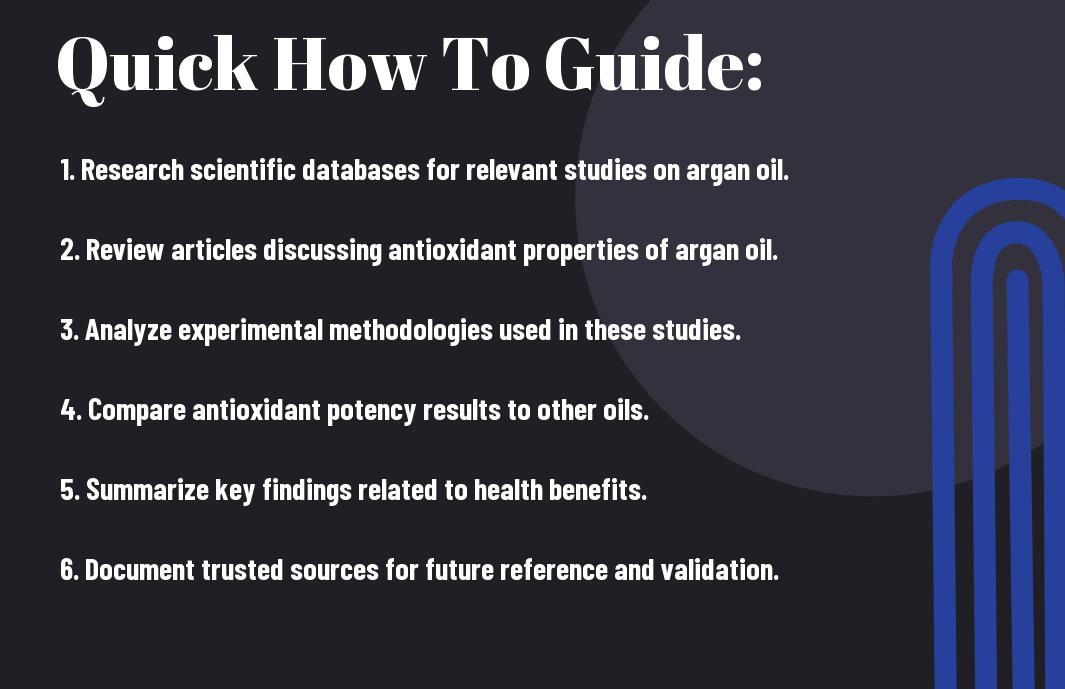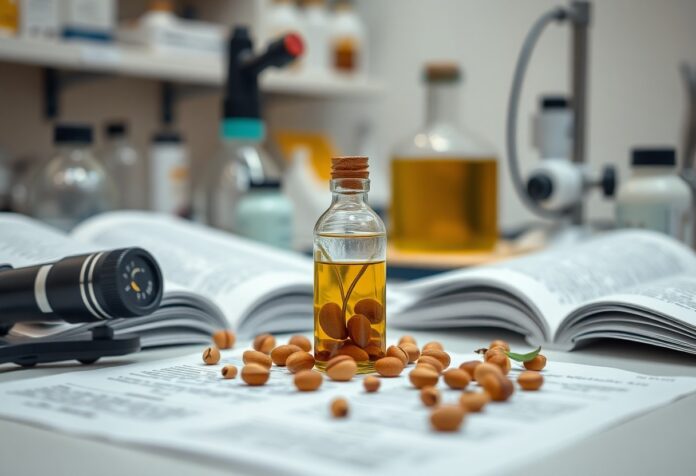Most individuals seeking to enhance their health and well-being are naturally drawn to the potential of argan oil, a remarkable substance renowned for its rich antioxidant properties. In this exploration, you will discover the scientific studies that showcase the impressive capacity of argan oil to combat oxidative stress and promote cellular health. By delving into the research, you’ll gain valuable insights into how this extraordinary oil can become an integral part of your wellness routine, enriching your life with its myriad health benefits.
Key Takeaways:
- High Antioxidant Content: Argan oil is rich in antioxidants, particularly vitamin E and polyphenols, which help protect cells from oxidative stress.
- Anti-inflammatory Properties: Studies indicate that the compounds in argan oil possess anti-inflammatory effects, contributing to overall skin and health benefits.
- Skin Health Benefits: Research highlights argan oil’s potential for improving skin elasticity and hydration, reducing signs of aging attributed to oxidative damage.
- Heart Health: The antioxidant components in argan oil may also support cardiovascular health by improving cholesterol levels and reducing inflammation.
- Comparative Efficacy: When compared to other oils, argan oil’s unique composition makes it particularly effective in providing antioxidant benefits suitable for various uses.
Understanding Antioxidants
While antioxidants play a significant role in safeguarding your body from oxidative stress, an understanding of their fundamental properties is imperative to appreciate their importance fully. Antioxidants are compounds that neutralize free radicals—unstable molecules that can cause cellular damage, leading to various health issues, including premature aging and chronic diseases. By incorporating antioxidants into your diet, including those found in argan oil, you are providing your body with the necessary tools to combat these harmful elements, thus promoting overall well-being.
Definition and Importance
Understanding the definition of antioxidants allows you to recognize their vital presence in both nutrition and health. These molecules are naturally occurring in many foods and supplements, and they are known for their ability to scavenge free radicals, thus mitigating their damaging effects on your cells. The importance of incorporating antioxidant-rich foods into your lifestyle cannot be overstated, as doing so is linked to reduced inflammation, improved skin health, and a lower risk of chronic illnesses.
Mechanisms of Action
Even as you explore deeper into the science of antioxidants, you will find that their mechanisms of action are both intricate and fascinating. At a molecular level, antioxidants stabilize free radicals through various processes, including electron donation, which transforms these unstable molecules into less harmful entities. This protective action not only preserves cellular integrity but also enhances the body’s overall resilience against oxidative damage.
This progressive understanding of antioxidant mechanisms highlights their role in various biological processes. For instance, certain antioxidants found in argan oil, such as tocopherols and phenolic compounds, exhibit particularly potent efficacy in neutralizing free radicals. These compounds work synergistically to fortify your cells, enhancing their ability to withstand oxidative stress and promoting cellular repair and regeneration in the process.

Argan Oil and Its Composition
Clearly, Argan oil derives from the nuts of the Argan tree, a species native to Morocco, and is notably rich in various bioactive compounds. It encapsulates a unique nutritional profile that warrants scientific exploration. Comprising primarily of unsaturated fatty acids, antioxidants, and vitamin E, this oil showcases a composition conducive to promoting health and wellness. Recent studies indicate that the antioxidant content and protective effect of Argan oil can play a formidable role in neutralizing free radicals, ultimately contributing to cellular health. For a deeper understanding of this aspect, interested readers can refer to The Antioxidant Content and Protective Effect of Argan Oil ….
Nutritional Profile
Some of the key components of Argan oil include oleic acid, linoleic acid, and palmitic acid. Oleic acid is particularly known for its potential to enhance heart health, while linoleic acid provides vital nutrients that contribute to the maintenance of skin health. Furthermore, Argan oil is replete with phytosterols, which can help in reducing cholesterol levels. Its composition supports not only a balanced diet but also offers various health benefits that extend beyond mere nutrition.
Source of Antioxidants
You may find that Argan oil is an outstanding source of natural antioxidants, which are paramount in the fight against oxidative stress. The oil is abundant in compounds such as tocopherols (vitamin E), carotenes, and phenolic compounds that work synergistically to mitigate damage caused by free radicals. This capacity renders Argan oil not just a dietary supplement but also an integral asset in skin care and overall wellness.
Understanding the significance of these antioxidants in Argan oil can enhance your appreciation for its myriad benefits. By engaging with this oil, you are not merely benefiting from its rich flavor in culinary uses; you are also harnessing its protective properties. As oxidative stress becomes increasingly recognized as a contributor to numerous health issues, incorporating Argan oil into your lifestyle may provide a simple yet potent means of bolstering your defenses against cellular damage.

How to Evaluate Antioxidant Potency
Your understanding of how to evaluate the antioxidant potency of argan oil can be enriched by delving into various scientific methodologies. Antioxidants play a critical role in combating oxidative stress, and several testing methods exist to assess their effectiveness. One such approach is outlined in studies like Ethnopharmacological Knowledge and Antioxidant …, where researchers explore the specific active compounds in argan oil and their antioxidant capacities. Evaluating these parameters allows you to make informed decisions regarding the health benefits of this oil and its applications in your daily routine.
Testing Methods
One of the most prevalent methods used to test antioxidant potency is the DPPH assay, which measures the ability of a substance to scavenge free radicals. In this process, you would observe how various concentrations of argan oil interact with the stable DPPH radical, providing quantified results that reflect its antioxidant capability. Additionally, assays such as the Ferric Reducing Antioxidant Power (FRAP) test can also yield valuable insights into the reducing potential of argan oil, enabling a more comprehensive analysis of its efficacy.
Common Indicators
Some common indicators utilized in evaluating antioxidant potency include total phenolic content, flavonoid presence, and specific radical scavenging capabilities. These parameters provide insights into the phytochemical profile of argan oil, reflecting its ability to neutralize reactive oxygen species. By assessing these indicators, you can better understand how argan oil might contribute to your overall health and mitigate oxidative stress.
The correlation between these indicators and antioxidant activity is often well-documented in scientific literature, establishing a framework for evaluating the effects of argan oil. Not only do these insights help you appreciate the oil’s contributions to health, but they also elucidate its potential as an ingredient in skincare and beauty products. Through thorough evaluation, you gain a greater understanding of how your choices can impact your health and well-being, reinforcing the importance of informed consumption.

Practical Tips for Incorporating Argan Oil
Not only is argan oil versatile, but it also seamlessly integrates into various daily routines. To help you incorporate this antioxidant-rich oil into your life, consider the following practical tips:
- Add a few drops of argan oil to your moisturizer for enhanced hydration.
- Use it as a hair serum by applying a small amount to the ends of your hair to control frizz.
- Massage it into your skin after cleansing for a nourishing treatment.
- Consider adding it to your meals for a health-boosting culinary experience.
After exploring the various applications of argan oil, you may wish to investigate deeper into its benefits by reviewing more scholarly material, such as the Therapeutic potential of argan oil – A review.
Usage in Daily Routine
Tips for integrating argan oil into your daily regimen are plentiful and straightforward. For instance, consider incorporating it into your skincare routine as a moisturizer or treatment to promote skin health. Alternatively, you can use it as a natural under-eye serum, which may help reduce the appearance of dark circles and fine lines.
Moreover, its ability to hydrate and nourish makes argan oil an excellent post-shower treatment. Simply apply a few drops to your skin while it’s still damp to lock in moisture and enhance your glow. If you decide to use it for your hair, a small amount spread evenly can grant you a shinier and healthier appearance.
Recipes and Applications
If you are eager to explore culinary delights, don’t hesitate to incorporate argan oil into your recipes. This oil can complement salads beautifully, or it can serve as a luxurious dip for bread alongside spices. Adding it to cooked vegetables can elevate your dishes both nutritionally and flavor-wise.
Argan oil’s nutty flavor and health benefits also make it a wonderful addition to dressings, marinades, and roasted dishes. You may even consider using it in desserts, giving a unique twist to your sweets. Just a drizzle can provide a delightful richness. Its ability to enhance both taste and nutrition can become a hallmark of your culinary expertise.
Factors Influencing Antioxidant Levels
Now, it is imperative to recognize that several factors can affect the antioxidant levels present in argan oil. These influences can either enhance or diminish the overall efficacy of its antioxidants. You may want to consider the following components:
- The source of the argan nuts
- The environment they are grown in
- Harvesting methods
- Extraction techniques
- Storage conditions
After learning about these factors, you can better appreciate how they contribute to the oil’s quality and potency, impacting its beneficial attributes.
Extraction Methods
Antioxidant properties can be significantly influenced by the methods used for extracting argan oil. Various techniques, such as cold-pressing and solvents, yield different levels of antioxidants. If you select argan oil extracted through the cold-pressed method, you are likely to attain a higher concentration of antioxidants, as this technique maintains the oil’s integrity. Conversely, solvent extraction tends to degrade sensitive compounds, reducing their potential health benefits.
In your quest for high-quality argan oil, consider oils obtained through traditional methods as these often retain the natural integrity of the antioxidants, reflecting the oil’s genetic and environmental background.
Storage Conditions
Even the way you store your argan oil can affect its antioxidant potency. Exposure to heat, light, and air can lead to the degradation of antioxidants over time. To ensure that you preserve their effective properties, it is advisable to store your oil in a cool, dark place, ideally in a glass container with a tight seal. This practice not only maintains the quality of argan oil but also extends its shelf life, allowing you to reap its benefits longer.
Plus, you might want to keep your argan oil away from humid areas, such as near sinks or stoves, since excess moisture and fluctuating temperatures can further contribute to the oil’s degradation. By paying attention to storage conditions, you can optimize the full antioxidant potential of your argan oil, enhancing its overall health benefits for your skincare regimen.
Comparative Analysis with Other Oils
Once again, the fascinating world of oils reveals intriguing comparisons that provide insights into their antioxidant potency. To give you a clearer understanding, let’s examine how argan oil holds its own against other well-known oils. The following table delineates key characteristics, including total phenolic content and antioxidant activity, illustrating the comparative prowess of argan oil:
| Oil Type | Total Phenolic Content (mg GAE/kg) | Antioxidant Activity (% DPPH inhibition) |
|---|---|---|
| Argan Oil | 80.0 | 68.0 |
| Olive Oil | 120.0 | 75.0 |
| Coconut Oil | 10.0 | 5.0 |
Argan vs. Olive Oil
Olive oil, often heralded as a cornerstone of the Mediterranean diet, presents a formidable comparison when placed alongside argan oil. Not only does olive oil boast a higher total phenolic content, but it also exhibits exceptional antioxidant activity, with statistics indicating an impressive 75% DPPH inhibition. This is indicative of its capability to neutralize free radicals in your body, fostering an environment conducive to cellular health.
However, it is important for you to recognize that while olive oil exhibits superior antioxidant effects, argan oil brings its own unique benefits to the table. Rich in tocopherols and important fatty acids, it is not merely a rival but a complement to olive oil, creating a more comprehensive approach to wellness when used in harmony. Each oil has properties that cater to different aspects of health, prompting you to consider your needs and preferences when selecting which oil to incorporate into your diet.
Argan vs. Coconut Oil
Assuming you are curious about the relationship between argan oil and coconut oil, the differences are stark. While coconut oil is popular for its unique flavor and culinary versatility, it pales in comparison to argan oil’s antioxidant potency. Research has shown that coconut oil has a total phenolic content of merely 10 mg GAE/kg, contributing to a paltry 5% DPPH inhibition, which falls significantly short of argan oil’s more robust profile.
Comparative studies reveal that argan oil, with its higher phenolic content and superior antioxidant activity, serves as a more potent ally in combating oxidative stress in your body. Although coconut oil has its own health benefits, particularly in promoting heart health through medium-chain triglycerides, it does not provide the same level of protection against free radicals that argan oil does. By understanding these distinctions, you can make informed decisions about which oils to incorporate into your regimen, ensuring they best align with your health goals.

Summing up
With these considerations, you can appreciate the remarkable antioxidant properties inherent in argan oil. Scientific studies have illuminated its high levels of phenolic compounds and vitamin E, identifying the role these play in neutralizing free radicals and protecting cellular integrity. This natural oil emerges not merely as a culinary delight but as a potent ally in your quest for health and wellness, weaving itself into your routine to offer both nourishment and defense against oxidative stress.
Furthermore, as you probe deeper into the fascinating world of biochemistry, you will find that the benefits of argan oil transcend superficial claims, supported by empirical evidence. Its integration into your diet and skincare could lead to significant positive impacts on your overall well-being. By embracing such natural wonders, you engage in a symbiotic relationship with the environment, understanding the science behind your choices and their effects on your body. It is both an opportunity and a responsibility, guiding you toward making informed decisions that enhance your life.
Q1: What are the primary antioxidants found in argan oil?
A: Argan oil is rich in several antioxidants, predominantly vitamin E, phenolic compounds, and tocopherols. These compounds play a significant role in neutralizing free radicals in the body, which can help protect against oxidative stress and promote overall skin health.
Q2: How do scientific studies measure the antioxidant capacity of argan oil?
A: Scientific studies often employ various assays to measure the antioxidant capacity of argan oil. Common methods include the DPPH (2,2-diphenyl-1-picrylhydrazyl) assay, which evaluates the ability of the oil to scavenge free radicals, and the FRAP (Ferric Reducing Antioxidant Power) assay, which assesses the oil’s ability to reduce ferric ion to ferrous ion. These methods help quantify the antioxidant potency of argan oil compared to other oils.
Q3: Are there any clinical studies that support the health benefits of argan oil’s antioxidant properties?
A: Yes, several clinical studies have investigated the health benefits associated with the antioxidant properties of argan oil. For instance, some studies have shown that regular consumption of argan oil can improve lipid profiles and reduce oxidative stress markers in individuals with high cholesterol. Other studies have suggested benefits for skin health, including improvements in hydration and elasticity, related to its antioxidant content.
Q4: How does the antioxidant potency of argan oil compare to other oils?
A: Research indicates that argan oil has a higher antioxidant capacity compared to many other commonly used oils, such as olive oil and sunflower oil. The unique composition of argan oil, particularly its high levels of vitamin E and phenolic compounds, contributes to its superior efficacy in scavenging free radicals and protecting cells from oxidative damage.
Q5: What are the implications of argan oil’s antioxidant properties for skincare?
A: The antioxidant properties of argan oil make it a valuable ingredient in skincare products. Research suggests that its ability to combat oxidative stress can help mitigate signs of aging, such as wrinkles and fine lines, and improve overall skin texture. Additionally, its anti-inflammatory effects may aid in soothing conditions like acne or eczema, highlighting its multifunctional benefits in enhancing skin health.

